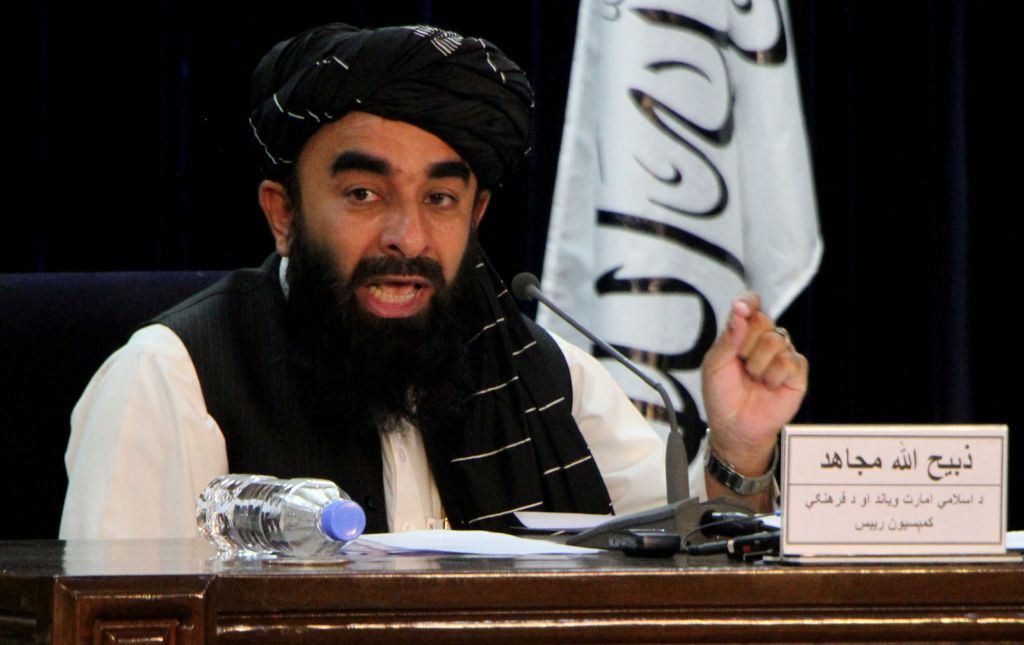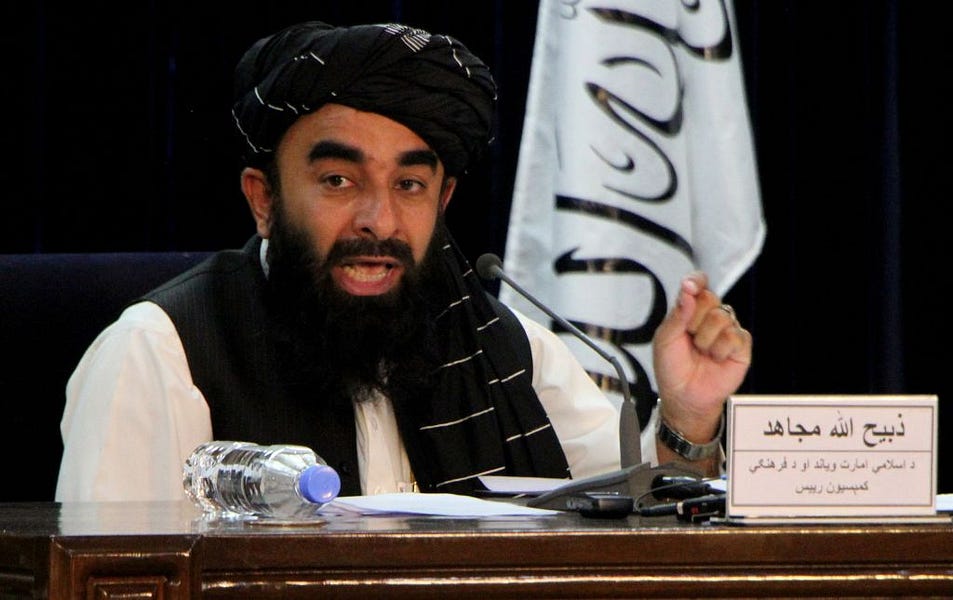Happy Wednesday! Today seems as good a day as any to remind you that The Dispatch has a merch store replete with Yeti tumblers, Morning Dispatch mugs, T-shirts, and more. Spread the word!
Quick Hits: Today’s Top Stories
-
The Taliban unveiled its interim government for Afghanistan on Tuesday, returning many hardliners to roles similar to the ones they held from 1996 to 2001. No women or members of Afghanistan’s fallen government were selected for the cabinet, but it includes former Guantanamo detainees and members of the al-Qaeda-aligned Haqqani Network.
-
A Burmese shadow government on Tuesday declared war against the military junta that overthrew former leader Aung San Suu Kyi in February’s coup. National Unity Government Acting President Duwa Lashi La called on Burmese citizens “in every corner of the country” to rebel against military rule.
-
In the wake of Hurricane Ida, the U.S. Coast Guard said it is investigating approximately 350 reports of oil spills in the Gulf of Mexico, and the Louisiana Department of Health reported 141 hospitalizations—and four deaths—due to carbon monoxide poisoning. Approximately 400,000 customers in Louisiana remained without power as of Tuesday night.
-
The United Nations’ International Atomic Energy Agency said Tuesday that Iran is refusing to grant inspectors access to nuclear-related sites in the country while continuing to bolster its nuclear activity.
-
Mexico’s supreme court ruled Tuesday that a law in the state of Coahuila imposing up to three years of prison time for women who received abortions was unconstitutional, effectively decriminalizing the practice nationwide.
-
Adlai Stevenson III—former U.S. senator from Illinois and descendant of both a vice president and governor—died on Monday at the age of 90.
Taliban’s Interim Government Is a Return to the Old Guard

In the days since the United States completed its military withdrawal from Afghanistan, the Biden administration has reiterated time and time again that it will “judge the Taliban by its actions, not its words.” But it’s barely been a week, and its actions are already failing to live up to the group’s flowery promises of reform.
On Saturday, the group cracked down on protests in Kabul, assaulting women with rifle butts, tear gas and metal clubs. It cemented its stranglehold over the country by overcoming resistance forces in Panjshir Province. Reports have emerged in recent days that the Taliban is preventing a handful of charter flights with Americans and Afghan allies from leaving Mazar-i-Sharif because, as Secretary of State Antony Blinken told reporters yesterday, there are some people “without valid documents” aboard that the Taliban says “at this point can’t leave.”
The starkest reminder that this is still the same old Taliban, however, came Tuesday when the group announced a governing team headed by many of the very same figures from the Taliban’s past—including one terrorist with a $10 million bounty on his head from the U.S. government.
The Taliban’s emir is Haibatullah Akhundzada, who has led the group since 2016, when he ascended to power after a U.S. drone strike in Pakistan killed former leader Akhtar Mohammad Mansour. Akhundzada is a shadowy, reclusive figure who has avoided the public eye for years, and is one of the Taliban leaders not on the United Nations sanctions list. His son Abdur Rahman died as a suicide bomber in 2017 at an Afghan military base in Helmand.
The group tapped U.N.-blacklisted Mullah Mohammad Hassan Akhund to lead the interim government as prime minister of the council of ministers. Akhund is a founding member of the Taliban and served as deputy prime minister and foreign minister when the group was last in power from 1996 to 2001.
Mullah Abdul Ghani Baradar—a high-profile member of the group who became its number two after the death of Taliban founder Mullah Mohammad Omar in 2013—will serve as acting deputy minister of the council. Baradar spearheaded negotiations with the United States and signed the February 2020 agreement in Doha that led to the U.S. troop withdrawal.
The group also appointed heads for the ministries of defense, foreign affairs, finance, justice, and information, but perhaps most controversial among the picks is the group’s choice of Sirajuddin Haqqani to lead the ministry of interior. Haqqani, who authored a New York Times op-ed in February 2020 as the deputy leader of the Taliban, is wanted by the FBI for his connection with a January 2008 attack on a hotel in Kabul that left six dead, including one American.
He is also leader of the Haqqani Network, a U.S.-designated terrorist organization with deep ties to al-Qaeda. And those ties don’t stop with Haqqani. “There are other Taliban leaders with links to al-Qaeda,” Bill Roggio, senior fellow at the Foundation for Defense of Democracies, told The Dispatch. “[Haqqani’s] just the most obvious.”
Tuesday’s announcement of the governing council is almost assuredly the final nail in the coffin of the Islamic Republic of Afghanistan, established just under two decades ago. Experts stressed that there is nothing really new about this government at all: It’s primarily composed of longtime Taliban leaders, many of whom were at the helm or in the leadership pipeline when the Islamic Emirate of Afghanistan was last in power.
“It’s like the mob, it’s a family business,” Roggio said of the Taliban’s new government. “It’s not new blood, it’s just the next generation.”
Baradar told Al Jazeera the government will be “inclusive,” and spokesman Zabihullah Mujahid has claimed that the interim government “won’t be based on ethnicity.”
Unsurprisingly, claims of a kinder, gentler Taliban were false. No women, religious minorities, or members of the previous Afghan government were included in Tuesday’s announcement, and nearly all of the group’s top leaders are ethnic Pashtuns, with the exception of one deputy prime minister who is an Uzbek from the northeastern Badakhshan province. Meanwhile, the Shiite Hazara community, which makes up a fifth of the nation’s population, is entirely unrepresented.
The Taliban’s ideology has not changed since the group last held power 20 years ago. “They haven’t actually really claimed to have changed at all—that’s all western media reading into their statements what they want to see,” said Thomas Joscelyn, senior fellow at the Foundation for Defense of Democracies and author of The Dispatch’s Vital Interests newsletter. “They’ve actually been very clear their ideology is the same.”
The Biden administration has thus far waffled on whether and how it will recognize and deal with the Taliban government. Gen. Mark Milley, chairman of the Joint Chiefs of Staff, told reporters in a press briefing last week that “it’s possible” the U.S. will work with the Taliban to fight ISIS-K, but Defense Secretary Lloyd Austin jumped in shortly after those remarks to say he “would not want to make any predictions.”
In a gaggle with reporters aboard Air Force One Tuesday, White House Press Secretary Jen Psaki said there is “no rush to recognition,” and that recognition would be “dependent on what steps the Taliban takes.”
“The world will be watching whether they allow for American citizens, whether they allow individuals to leave who want to, and how they treat women and girls around the country,” she added. “I don’t have a timeline for you; it depends on what behavior they exhibit on the ground.”
But the Taliban once again made clear its view of women’s rights on Tuesday, cracking down on a second protest in Kabul that reportedly started off peacefully until Taliban fighters began firing their weapons into the air and beating back activists with clubs. There have not yet been any reports of fatalities stemming from the protests.
But experts see these crackdowns as a warning of what’s to come: In the two decades since the Taliban last ruled the country, many Afghan women obtained access to education and the job market for the first time. Now, many fear a return to a repressive system where they are unable to go out in public without male accompaniment and face harsh public beatings and floggings if they violate the government’s restrictions.
The Taliban has yet to receive formal recognition from any other government, but the Russian, Chinese, Qatari, Turkish, and Pakistani embassies have remained open in Kabul. Pakistan, Saudi Arabia, and the United Arab Emirates were the only countries to recognize the Taliban’s rule in the 1990s.
“I don’t know if the United States will recognize them. I think it’s obvious that they shouldn’t,” Joscelyn said. “There’s no reason to recognize a terrorist regime and pretend it’s legitimate. That would be the final defeat in this long war for America to do so.”
Hugo Llorens, who served as U.S. special chargé d’affaires of the U.S. Embassy in Kabul from 2016 to 2017, told The Dispatch the international community will likely have “no choice” but to deal with the Taliban, but that he doubts the Biden administration will grant the group formal recognition any time soon.
“Democracy is dead” now that the Taliban has taken over, Llorens added. “You have to understand their mindset—above all else, it’s about power. They will never cede power for money.”
As the Taliban continues to consolidate its rule over Afghanistan, the State Department claims that roughly 100 American citizens—many of whom are dual-national citizens—remain stuck in the country. “We’re in direct contact with virtually all of them,” Secretary of State Antony Blinken said at a news conference on Tuesday in Doha, Qatar, where the American diplomatic mission has been relocated. “We have case management teams assigned to them to make sure that those who want to leave can, in fact, do so.”
But veterans and members of Congress working to evacuate the remaining Americans tell The Dispatch that the Biden administration’s estimates of the number of stranded Americans are low. And thousands of Afghans who could have qualified for special immigrant visas have been abandoned, too. “I have a lot of people who worked for me on my staff who are Afghans who would’ve qualified for SIVs,” Llorens said. “Some of them got out, but many, many, many of them did not get out.”
Tigray Situation Worsens
Almost a year after Ethiopian Prime Minister Abiy Ahmed’s offensive in the northern Tigray region began—and two years after Abiy won the Nobel Peace Prize—civil war persists. While government forces and Tigrayan paramilitaries boast thousands of “enemy” deaths amid new clashes, Tigray’s civilian population faces food shortages, gender-based violence, mass detentions, extrajudicial executions, and displacement.
When we wrote to you back in June about Ethiopia’s mounting humanitarian crisis, the U.N. had recently deemed the risk of famine in the region the single worst a country has faced in the last decade. Many of their warnings are now coming to pass: At least 150 people in Tigray died of starvation last month, the Tigray External Affairs office said in a Twitter briefing Monday.
The briefing accused the federal government of orchestrating a blockade in violation of U.N. Security Council resolution 2417, which classifies tactical starvation in conflict as a war crime. Its leadership has unequivocally denied the charge.
The region of 6 million people has been effectively without food assistance since last month, with the government delaying or halting incoming U.N. and non-governmental aid convoys out of concern they’ll reach rebel forces. Tigray’s more than 2 million internally displaced people are particularly vulnerable to the food and water shortages. The memo also noted that nearly 20,000 children currently face severe malnutrition.
Civilians in hiding and witnesses in neighboring Sudan have also alleged mass detentions and killings in the Tigrayan town of Humera, which is currently under the control of government forces, sparking fear that Abiy is carrying out a deliberate campaign of ethnic cleansing against the ethnic minority.
“The cumulative wanton destruction and robbery of public and private property, coupled with a siege extending the eight-month-long genocidal war, will have a long-term debilitating impact on Tigray’s future,” the Tigray External Affairs office said. “The reluctance of the international community to take firm and meaningful measures countering the federal government’s systematic design to starve the people of Tigray into submission has encouraged not just the maintenance but the consolidation of the siege.”
The federal government, meanwhile, claimed that the Tigray People’s Liberation Front (TPLF)—the ruling political party of Tigray’s regional government—looted warehouses and stole food aid from its civilian population. In an interview with the Ethiopian Broadcasting Corporation, USAID’s mission director to Ethiopia, Sean Jones, said that such allegations were likely and added that reports of Ethiopian and Eritrean forces stealing food have also emerged.
The conflict, which began last November following political disputes between Prime Minister Abiy Ahmed’s government and Tigrayan leadership, now threatens to bring humanitarian crises to Tigray’s neighboring regions of Afar and Amhara. Militia forces claimed to have killed 3,073 government troops, while the government claimed 5,600 rebel deaths in recent fighting.
“The situation has become increasingly difficult, with health structures overcrowded, medical supplies not adequate or lacking, and not enough human resources to take care of patients who need an immediate surgical intervention,” Apollo Kinyokie Barasa, the Red Cross’ health coordinator, said of the spreading fighting’s aftermath.
The conflict hit a turning point earlier this summer, when Tigrayan fighters captured swaths of the region’s territory, including its capital of Mekelle. Shortly after, the government declared a “unilateral ceasefire,” which the rebels flatly rejected. Violence has escalated ever since.
According to Ethiopia’s foreign ministry, TPLF forces have compounded the humanitarian problem by invading the adjacent Amhara and Afar regions, which the government claims has displaced an additional 500,000 people. “The TPLF killed many civilians and decimated villages in the two regions,” the foreign ministry claimed. “This has clearly demonstrated that the TPLF is bent on creating havoc contrary to the spirit of the unilateral humanitarian ceasefire declared by the federal government.”
Analysts also fear that the war could draw new actors. Oromo Liberation Army leader Kumsa Diriba said last month that the group had forged an alliance with the Tigrayan fighters. “The only solution now is overthrowing this government militarily, speaking the language they want to be spoken to,” he told the Associated Press.
“Ethiopia is at risk for a broader conflict that could open old wounds outside of Tigray,” Emily Estelle of the American Enterprise Institute’s Critical Threats Project told The Dispatch. “The announcement by an Oromo rebel group last month that it would ally with the TPLF is particularly worrisome. The Oromo are the largest ethnic group in Ethiopia but are historically marginalized.”
“U.S. leverage is likely limited, but Washington should still try to pressure the Ethiopian government to allow humanitarian access. The sanctioning of an Eritrean general for human rights abuses in Tigray in late August is one sign of how the administration is approaching this,” Estelle added. “The U.S. should consider sanctioning individuals on either side of the conflict that are intentionally harming civilians.”
Amb.. Richard Mills, the United States’ deputy representative to the United Nations, addressed the body two weeks ago, arguing that “negotiations for a ceasefire and political discussion on a way forward must commence immediately.”
Worth Your Time
-
BuzzFeed News editor Katherine Miller wrote an excellent essay about the ways this summer failed to live up to post-pandemic expectations, and why the country seems so angry as a result. “Is there something that connects all this?” she asks. “The flight attendants having to duct-tape passengers to seats, AND the undercurrent people invoke about the deep/quiet/silent anger of the collective body, about the division between the vaccinated majority of American adults and the unvaccinated minority, whose anger often predominates, AND the despairing anger about schools and who should be inside and outside them, AND the despairing anger about people left behind in Afghanistan, AND the people tearing each other apart over the second season of a TV show. It’s wrong to shout at someone making $8 an hour behind a counter about an inconvenience, and there’s a deep human dimension to the inner anger of some hospital nurses and doctors in a pandemic; these are not the same. But this is a society soaked through with anger, and unpredictably so.”
-
Esteemed actor Michael K. Williams was found dead on Monday, reportedly from a drug overdose. The man behind The Wire’s Omar Little had long struggled with addiction, but got clean about a decade ago with the help of a minister in New Jersey. “I thought, ‘Why me? Why did I get spared?’ I should’ve been dead,” Williams told Kevin Manahan in 2012 when asked why he decided to go public with his own struggles. “I have the scars. I’ve stuck my head in the lion’s mouth. Obviously, God saved me for a purpose. So, I decided to get clean and then come clean. I’m hoping I can reach that one person.”
Presented Without Comment
Also Presented Without Comment
Toeing the Company Line
-
Sarah dove into redistricting and Gen-Z’s politics in yesterday’s Sweep before turning the newsletter over to Chris Stirewalt on Republican legal activism and Andrew on Gov. Kristi Noem and the intra-GOP fights over vaccine mandates. “Republicans have gone from being the party of tort reform to becoming the party of legislation by litigation,” Stirewalt writes.
-
Jonah’s Remnant guest on Tuesday was some guy named David French. The two chat for an hour-and-a-half about Texas’ new abortion law, Supreme Court history, and the 20th anniversary of 9/11. Stick around to the end to get their thoughts on the new Spider-Man trailer.
Let Us Know
How should the U.S. respond to the ongoing violence and mayhem in Tigray?
Reporting by Declan Garvey (@declanpgarvey), Andrew Egger (@EggerDC), Charlotte Lawson (@charlotteUVA), Ryan Brown (@RyanP_Brown), Harvest Prude (@HarvestPrude), and Steve Hayes (@stephenfhayes).







Please note that we at The Dispatch hold ourselves, our work, and our commenters to a higher standard than other places on the internet. We welcome comments that foster genuine debate or discussion—including comments critical of us or our work—but responses that include ad hominem attacks on fellow Dispatch members or are intended to stoke fear and anger may be moderated.
With your membership, you only have the ability to comment on The Morning Dispatch articles. Consider upgrading to join the conversation everywhere.